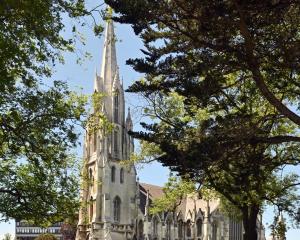New Zealand had little choice but to sign up for its minimal contribution to the United States organised coalition against the Islamic State in Iraq and Syria (Isis).
We have to indicate a concrete commitment against the vicious barbarism of Isis, and we have been under prolonged pressure from the US, Britain, and Australia.
The decision-taking has been slow and deliberate, and the decision will take months to put into effect.
It has not been a rush to arms, and it does give us a right to be rigorous even vociferous critics within the ''tent'' - a right we must exercise.
Having dipped a toe into the treacherous cross-currents of Syria and Iraq, we should be wide awake about the ever-shifting environment.
Syria was mentioned first here because it is the primary generator of the troubles since 2011 and recent Iraqi events are really just spill-over.
First, there is the Obama Administration.
The US president's priority in the Middle East, above and beyond Isis, is a deal with the Iranian Shi'ite theocratic regime.
Inevitably, this would not just be an arrangement to limit Iran's nuclear programme, but would also involve US toleration of Iran's hegemonic ambitions across the eastern Arab world.
Already Iranian support of President Bashar al-Assad, of Syria, amounts to colonisation of that country and participation in the savage repression and mass murder of Sunni Arab Syrians.
Then we have Iranian steerage of Iraqi Shi'ites, intimidation of most Lebanese and interference in Yemen.
Barack Obama making a deal with Iran will put us on one side in the Sunni-Shi'ite sectarian breakdown in the Middle East.
Rest assured, the Obama Administration will not hesitate to throw us and Sunni Arab allies like Jordan under a bus if it feels it is drawing close to the holy grail of such a deal.
Second, there is Bashar al-Assad.
We must never allow the Obama Administration to draw us into even the remotest association with this most monstrous war criminal through associations with his allies - Iran and powerful forces in the Iraqi Government.
We should remember what is primary and what is secondary in developments since 2011 in Syria and Iraq.
We would not have Isis if Bashar al-Assad had not turned Syria into a wasteland of fury and fire storms.
Yes, Isis has antecedents in Iraq, but its particular ferocity, dynamism, and mobilisation capacity come out of the Syrian furnace - out of the mess created by the Syrian regime.
Isis can only be finally undone in its core territory in eastern Syria, and the Sunni Arab jihadist sympathies that are its central support cannot be conclusively deflated without regime change in Syria.
As events draw closer to concentrating on Isis in Syria, we may face new pressures about our involvement.
Third, we need to be wary about the more immediate Iraqi setting.
Perhaps we have had little choice even about where to locate, given what the United States and Australia wanted, but selecting the Taji facility near Baghdad already sends messages before we even get there.
It puts us close to the Iraqi Government, which is heavily Shi'ite Arab and has not yet properly proved inclusive, and nowhere with the Kurds.
They may become suspicious about whom we end up training and where and against whom those we train might ultimately fight.
It would be wise and good manners to be a little attentive to the Kurdistan regional government as well as to Baghdad, because Kurds have been leading ground forces of the coalition and, beyond being grateful for air strikes, are unhappy about equipment supplies.
Otherwise, we should be careful about becoming perceived by Iraqi Sunni Arabs, for example in the vicinity of Taji, as a tool of Shi'ite politicians and of the Iranian theocracy.
We are entering an arena of interrelated hostilities 800km across.
It at present includes the war of the Syrian regime, Iran, and Lebanese Hizbollah on the Syrian opposition up against the Israeli Golan front and around Damascus and Aleppo; Isis fights against Syrian Kurds and opposition factions across northern and eastern Syria; and the campaign of the loose local and international coalition, with Iranian intrusion, against Isis in Iraq.
We need to keep abreast of it all, and to offer sensible comment.
It is not our role to end up on one side of the Sunni/Shi'ite divide.
• Prof Harris, from the department of politics at the University of Otago, specialises in the politics and history of Syria, Iraq, Lebanon and Turkey. He was recently in northern Iraq-Kurdistan.










